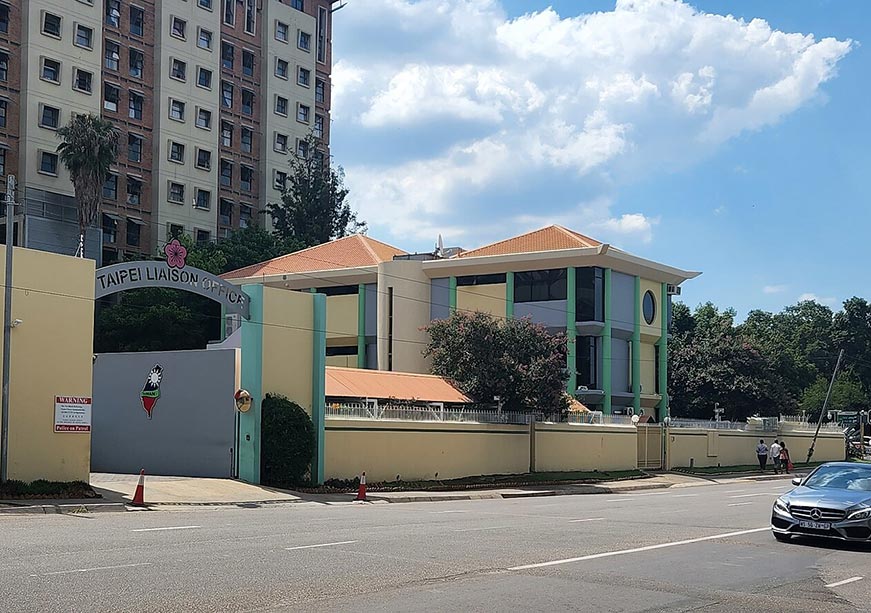-
CENTRES
Progammes & Centres
Location
South Africa recently told Taiwan to move its unofficial embassy from Pretoria to Johannesburg.

Image Source: Wikimedia Commons / Discott
The recent decision by South Africa’s newly formed Government of National Unity (GNU) to relocate the unofficial Taiwanese embassy, known as the “Taipei Liaison Office,” from Pretoria to Johannesburg reflects pressure from the Chinese government and forceful imposition of its One China principle. The instruction to rename the liaison office as a trade office further underscores the non-diplomatic nature of the relationship, aligning with China’s concerted efforts to isolate and intimidate Taiwan globally.
Ultimately, there was little Taiwan could have done to prevent this outcome. Despite its historical ties to South Africa’s apartheid regime, Taiwan has struggled to maintain its influence since the formation of the Black-majority government led by the African National Congress (ANC).
For two and a half years following their accession to power in 1994, the ANC pursued a flexible approach to the One China policy, officially recognizing both Taiwan and China. Taipei still held considerable bargaining power with the ANC because it had financially supported the ANC’s 1994 electoral campaign and invested heavily in their Reconstruction and Development Program (RDP).
However, the looming 1997 British handover of Hong Kong to China shifted the dynamics, allowing China to threaten countries recognizing Taiwan with restrictions on their presence in Hong Kong. Ultimately, in November 1996, the Mandela administration yielded to this pressure and announced its decision to sever ties with Taiwan in favor of China, aligning with the One China principle.
Taiwan’s approach to engaging with South Africa has been one of “hide and seek,” as it aimed to avoid confrontation with China and focused on community-level initiatives.
Despite the diplomatic switch, South Africa allowed Taiwan to maintain a symbolic presence through a liaison office in Pretoria. Since then, Taiwan’s approach to engaging with South Africa has been one of “hide and seek,” as it aimed to avoid confrontation with China and focused on community-level initiatives. While many of these grassroots projects were effective and yielded significant results, they paled compared to China’s large-scale investments. As Taiwan kept a low profile and concentrated on local efforts, China actively attracted government officials with substantial loans and grants.
While this represents a significant setback for Taiwan’s aspirations of external sovereignty, it is not the first instance of an African country relocating Taiwan’s liaison office from its administrative capital. In 2017, Nigeria requested Taiwan to move its office from Abuja to Lagos. Taiwan complied.
Over the past two decades, a number of African nations, including Burkina Faso, Chad, Gambia, Liberia, Malawi, Senegal, and São Tomé and Príncipe have severed formal relations with Taiwan. Currently, Eswatini, a small monarchy in South Africa’s neighborhood, stands as Taiwan’s last remaining diplomatic ally in Africa.
In South Africa, Taiwan operates two offices: one in Pretoria and another trade office in Cape Town. Although the Taiwan Foreign Ministry has staged a Potemkin protest and rejected the decision to relocate from the capital, the decision appears irreversible. Taiwan cited the 1997 agreement regarding the location of their mutual representative offices established after severing formal diplomatic relations. Nonetheless, South Africa has insisted that Taiwan relocate within six months.
Taiwan cited the 1997 agreement regarding the location of their mutual representative offices established after severing formal diplomatic relations.
Taiwan has threatened South Africa with reciprocal measures, such as instructing South Africa to relocate its offices from Taipei, imposing stricter visa requirements for South Africans, and suspending educational exchanges; none of these options seem practical for Taiwan.
Apart from the Taiwanese Foreign Ministry, the only notable protest came from Tennessee Republican Senator Marsha Blackburn, who condemned China for its bullying tactics and urged the Biden administration to take action against South Africa for yielding to the Chinese Communist Party. However, there has been no response from the U.S. government.
The United States does have options for punitive actions against South Africa, especially considering that the country is the largest beneficiary of the African Growth and Opportunity Act (AGOA), which provides thousands of items with duty-free access to the U.S. market. South Africa has been under U.S. scrutiny since last year due to its naval exercises with Russia and China. While the country defended its actions as a matter of strategic autonomy and partnership choice – particularly given the timing around the anniversary of the Russia-Ukraine conflict – this rationale has not swayed several U.S. policymakers. However, based on past experiences with sanctions, withdrawing AGOA benefits is unlikely to change South Africa’s stance.
South Africa’s decision to further marginalize Taiwan’s presence is not surprising. In some ways, this development foreshadows the future of China-South Africa relations under the new coalition government.
South Africa’s decision to further marginalize Taiwan’s presence is not surprising. In some ways, this development foreshadows the future of China-South Africa relations under the new coalition government. In May 2024, for the first time in democratic South Africa’s history, the ruling ANC lost its absolute majority and had to ally with multiple opposition parties, including the Democratic Alliance (DA), the main opposition party. Historically, the DA has criticized South Africa’s close ties with China. This move by the ANC may be an attempt to reassure China that, despite the significant political changes in South Africa, the core principles of their bilateral relationship will remain intact.
The move also underscores the intense geopolitical competition on the African continent and the ongoing, though often subtle, pressure from China to undermine diplomatic support for Taiwan and further isolate it. The relocation will further solidify China’s position and diminish Taiwan’s de facto sovereignty.
This commentary originally appeared in The Diplomat.
The views expressed above belong to the author(s). ORF research and analyses now available on Telegram! Click here to access our curated content — blogs, longforms and interviews.

Samir Bhattacharya is an Associate Fellow at Observer Research Foundation (ORF), where he works on geopolitics with particular reference to Africa in the changing global ...
Read More +